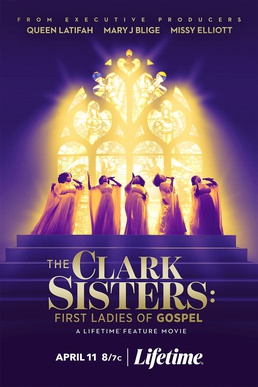‘The Clark Sisters: First Ladies of Gospel’ sheds light on a misconstrued world

“The Clark Sisters” explores the group’s influence on gospel music.
April 23, 2020
“Giving honor to God who is the head of my life.” If you were able to finish that sentence without actually reading it, you probably grew up in the “black church.”
Growing up a Black Southern Baptist is an experience like no other. While my friends were listening to Nicki Minaj and Chris Brown growing up, I was lending my ears to Gospel artists such as Kirk Franklin, Tasha Cobbs, and, of course, The Clark Sisters.
Naturally, excitement filled me when I heard about Lifetime’s new biopic, “The Clark Sisters: First Ladies of Gospel,” detailing the sisters’ journey to becoming the Gospel moguls that they are today.
“The Clark Sisters: First Ladies of Gospel” introduces a new generation to The Clark Sisters while telling the unpublicized story of the raw struggles that come with Christianity and exposing truths that must be handled within the church.
With contemporary Gospel music taking the church by storm, younger Christians may not know about the belting, mass choir sound of artists like The Clark Sisters. The movie has drawn a new audience to the Grammy-winning group, keeping their legacy alive. They have even released a new album, “The Return.” It is so important for the music industry along with younger audiences to recognize the importance of The Clark Sisters.
They are the highest-selling female group in the history of Gospel music, a title well-deserved. Most of their songs detail the pain experienced throughout their lives and how thankful they are that God has always been there for them. Their music combines traditional Gospel hymns and Bible verses with fresh beats and rhythm, creating songs that consume the hearts of both young and old audiences.
Simply listening to songs such as “Blessed and Highly Favored” has brought me to tears more than once, and listening to “You Brought the Sunshine” always puts me in a good mood. Whether it is sorrow, happiness, or gratitude, The Clark Sisters can manifest any emotion through their music.
The Clark Sisters are known for their emotional music. It is easy for one to wonder what struggles they have faced. This biopic answers that question and so many more. Most Christians feel pressure to be perfect, to hide their flaws out of fear of ridicule from the outside world.
In the biopic, Dr. Maddie Moss Clark, the sisters’ mom, is shown being physically abused by her husband, Reverend Elbert Clark. Her children witness this first hand but are powerless in stopping the abuse. Dr. Clark eventually divorces him.
Christians often feel a need to hide their struggles because they feel as if showcasing anything less than perfection to the secular world would blemish the image of Christianity. By including this aspect of their lives in the film, The Clark Sisters debunk this misconception. Allowing the worst parts of their lives to be broadcasted for the world to see is an act of true Christianity.
Real Christianity is not about perfection. It is about unity and love, and it promotes an environment that helps people to better themselves. The Clark Sisters’ movie does Christianity justice by showing that flaws are normal and should not be grounds for ridicule or embarrassment.
This movie is one of the best biopics I have seen in a while. It depicts these stars as what they are: real people. This could be viewed as a “Christian film,” but I feel that label does it an injustice. It is so much more. It is a story of struggle and pain. It is a story of a battle to reach your fullest potential. “The Clark Sisters: First Ladies of Gospel” provides a story that can be followed, understood and enjoyed by people of any background.








LaToya Bledsoe • Apr 24, 2020 at 9:24 am
This movie was legendary! I love the Clark Sisters especially Dorinda Clark-Cole. Always been a fan!
Madison Meeks • Apr 23, 2020 at 9:39 pm
Yes Niyah!!! I’m SOOO,SOO,SOOOO proud of you for this!!!